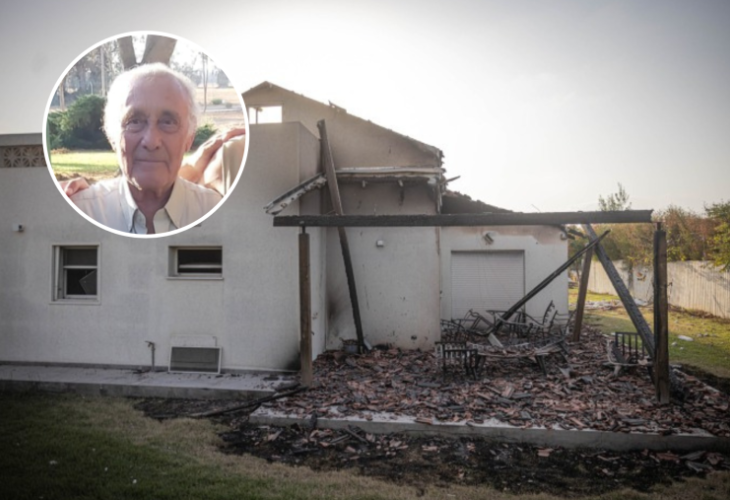The Holocaust
Moshe Ridler: Holocaust Survivor and Beloved “Grandfather of Holit” Murdered at 91
From surviving World War II to building a family in Israel, his life story and legacy of strength continue to inspire
 The destruction in the southern region (Photo: Chaim Goldberg/Flash90) Inset: Moshe Ridler (Credit: Comforting the Families of the Fallen Initiative)
The destruction in the southern region (Photo: Chaim Goldberg/Flash90) Inset: Moshe Ridler (Credit: Comforting the Families of the Fallen Initiative)Moshe Ridler was known as “the grandfather of Holit.” He was the oldest man in the kibbutz at 91 years old, until he was murdered in the Simchat Torah massacre, together with a foreign worker employed in his home.
In an interview with Yedioth Ahronoth, his grandchildren shared his remarkable life story. Moshe was at home with his caregiver when the terrorists infiltrated Holit and had just spoken with his family before contact was lost. That night, his family received the devastating news that he had been killed. The date of his murder was the same day the Jews of his hometown had been expelled during the war.
Childhood in War
“Grandpa was born in Romania and was nine years old when World War II broke out,” recalled his grandson Amir Tesler. “His father and older sister, Fani, were taken to labor camps, and he was deported to Transnistria with his mother and younger sister Mina. Both of them fell ill with typhus and died, leaving him completely alone.”
“At the age of 11, he saw a group of young people escaping the camp and joined them,” Amir continued. “He told us he ran and ran until he lost consciousness. When he woke up, he was in the home of a family in a rural village in Ukraine. He worked for them, tending their flock. Every morning he would follow the same route, passing by the Nazi station, greeting them, and continuing on with the sheep. That’s how he survived until the end of the war.
After the war, he returned alone to his hometown. Sitting on the steps of the synagogue, suddenly his father appeared before him — he couldn’t believe he was alive. Later, he was also reunited with his sister Fani.”
A New Life in Israel
At age 20, Moshe immigrated to Israel. He worked in the police and met his wife, the late Pia, with whom he had three children. Over time, his family grew to include ten grandchildren and eight great-grandchildren. About three years ago, he moved to Kibbutz Holit to live closer to them.
The Beloved Grandfather
“He was the grandfather of Holit, but also our grandfather,” said Amir. “When I was little, he took care of everything — he drove us around, came in the mornings with croissants and bourekas. He loved dancing and traveling abroad. His love for family and for life gave us so much strength, even after he turned 90.”
His grandson Liav Hendler added: “He never felt at home in assisted living or nursing homes. In the kibbutz he had the open spaces, the scenery, and the pool he loved so much. Family was always the most important thing to him. In the last decade, he opened up more and began to share what had happened during the war. He even told the hardest stories with humor. It mattered to him that we knew our family history, and that we remembered and carried it forward.”
A Legacy of Strength
“Grandpa always said that if you have something to be proud of, then be proud,” Amir concluded. “All those war stories were really stories of hope. He told them with so much pride. For him, the legacy was never to give up.
We were blessed with the best grandfather we could ask for. Until his very last day, nothing was more important to him than family. That gives us strength and carries us through these days. We want him to be remembered not for the tragic end he didn’t deserve, but for the life and joy he brought everywhere he went. That is his legacy: to endure everything he endured, and still give us all strength.”

